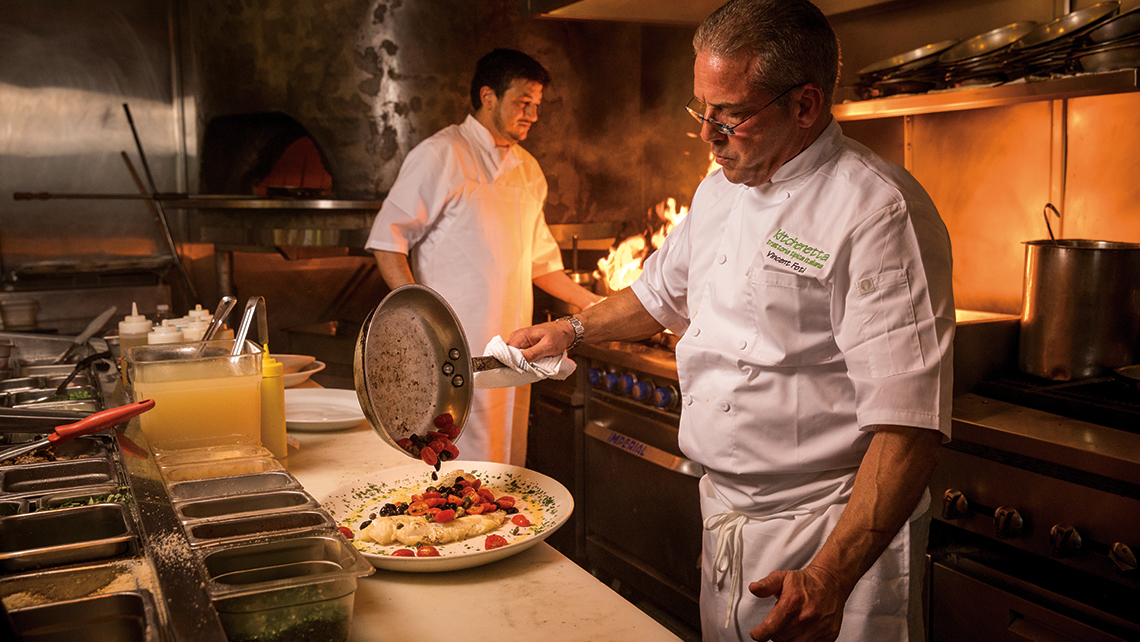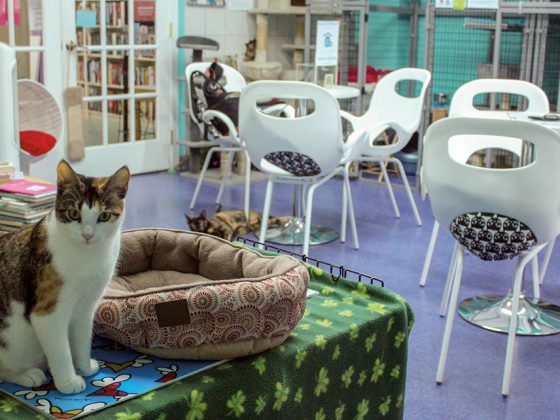Vincent Foti arrived in Fort Lauderdale in 1994. Until then, he’d only lived in the country’s two greatest metropolises – and he’d worked in the food industry in both. The native New Yorker grew up working both for family food businesses and then on his own before moving to Los Angeles as a young man and finding success in Italian restaurants there.
Then he came to Fort Lauderdale, took a look around and decided against getting into the restaurant business.
“I saw unique, esoteric restaurants here,” he says. “They required some explanation, if you will; they required the patron to come to the table with some information. And those restaurants did not make it.”
What did make it in Fort Lauderdale in 1994, Foti thought, were pedestrian places. Places that gave patrons exactly what they were expecting. It wasn’t the sort of food culture he was interested in being a part of, and he didn’t think the sort of restaurant he wanted to do would last.
“It made me a little nervous,” he says. “I come from the five boroughs of the city of New York and the greater Los Angeles area – the demographics of those areas are obviously different than the demographics here.”
And yet, nearly a quarter century after his arrival in Fort Lauderdale, Foti is talking about the city while sitting in the dining room of one of his two local restaurants. Along the way, something must have changed, right?
“I saw the society…become a little more complex,” he says. “I thought the marketplace was ready for me, so I didn’t have to dumb my ideas down.”
Foti doesn’t mean that to sound harsh. And he doesn’t want to make it sound like Fort Lauderdale’s transformation has been particularly unique. Nor is he the only person to identify a few different factors – the shrinking of the world in the internet age, people’s increasing knowledge of and interest in different foods in the age of food media – as elements of change in the restaurant business.
And even with a clientele that Foti believes will be more receptive to what he does, he still sees himself as something of an educator.
“Kitchenetta was opened as a traditional Italian trattoria,” Foti says. “It was meant to pay homage to the traditional Italian culinary diaspora.” One slight problem: Not everybody knows what that is.
“The average American walks into an Italian restaurant in Italy, they’re on vacation, and they order fettuccine alfredo,” he says. “And nobody in Italy knows what that is.”
People without experience of authentic Italian food didn’t know it. They knew more the red-and-white checkered tablecloth, spaghetti-with-meatballs Italian-American experience. “My dilemma was, how do I open up a real Italian restaurant, have it be well received by the public and not drive myself crazy or drive the public crazy?”
His first plan didn’t exactly involve doing things the easy way. When Kitchenetta opened, the menus were all in Italian. Every night, Foti would work the room, sitting down at tables and explaining dishes to customers. “Just because I know something,” he says, “that doesn’t mean everybody else should know it.”
If he walked into, say, a Tokyo sushi place, he’d be in over his head. And he’d hope somebody would help him. So he tried to treat others the way he’d want to be treated. The result? After two months he’d lost his voice.
“I decided to print a translation on the back of the menu to save my vocal cords from getting polyps on them,” he says.
But the gamble had paid off. People came, and came back. That was in 2004 and 14 years later, Kitchenetta – on Federal Highway just south of Oakland Park Boulevard, where restaurants are plentiful and rents are not cheap – continues to thrive. In 2016, it was joined by Vinnie’s, a slightly more traditional but still authentic place in Lauderdale-By-The-Sea.

For Foti, Italian food and the food business have always been in his life. As part of a big New York Italian-American family, he grew up on dishes passed down like oral histories. He also learned the business fast, thanks to a job at a greasy spoon and through a family business. His family also ran a fleet of ice cream trucks; Foti had a truck and a route before he was old enough to have a driver’s license. (He hired an older teenager as his driver.)
Other restaurant jobs came and eventually he traded coasts, heading out to Los Angeles looking to work in the entertainment business. But while he was doing that, he also earned a living in restaurants. It was there that he saw more of what it took to run a big, high-end Italian restaurant.
“I had the good fortune of working with some really good Italian chefs when I lived in L.A.,” he says.
He’s always been intellectually and academically curious. He researches dishes and finds adaptations. Old family recipes, things people brought back from Sicilian villages, meals that people just sort of knew – when he could, Foti would track down the source. He’d find a way to make it work in a professional kitchen.
When working like that, finding the right people to work with you is crucial.
“The kitchen becomes a learning place, a school if you will, for people who already know,” he says. “A graduate school.
“It’s a process. I’ve gone through probably six or seven different sous chefs in 14 years and probably three of them have the capability of adapting to what I want to do and how I want to do it.” One of his best chefs is the highly trained, Culinary-Institute-of-America-graduate American; another is the chef who hails from the same part of Italy as Foti’s wife. (“He intuitively knew a lot about this food,” Foti says of the latter.) Even with this kind of talent, Foti’s a constant presence in the kitchen until he’s comfortable that a new person gets what’s required.
“It’s a process,” Foti says. “You have to know people, you have to cultivate these people. It’s not just a process of putting somebody in there. That’s what a restaurant investor does, not a restaurateur.” A restaurateur, he says, is more like a film director. The actors may be very good, but it still requires take after take.
In the future, he’s got plans for more. But for now, two restaurants means Foti doesn’t get nights off like he used to. But he still tries to keep up with what’s new in Fort Lauderdale dining. And he likes what he sees. That trend he first noticed more than a decade ago – an area that was growing up and expanding its palate – continues. “It’s a snowball effect,” he says. “I think it’s going to get better and better and better, I really do.”
His advice to potential restaurateurs: Have an idea, and go for it. The audience is here.
“I think we’re ready now for the public to come to the restaurant instead of the restaurant coming to the public,” he says. “I think it’s time for some restaurateurs to take some chances.”












